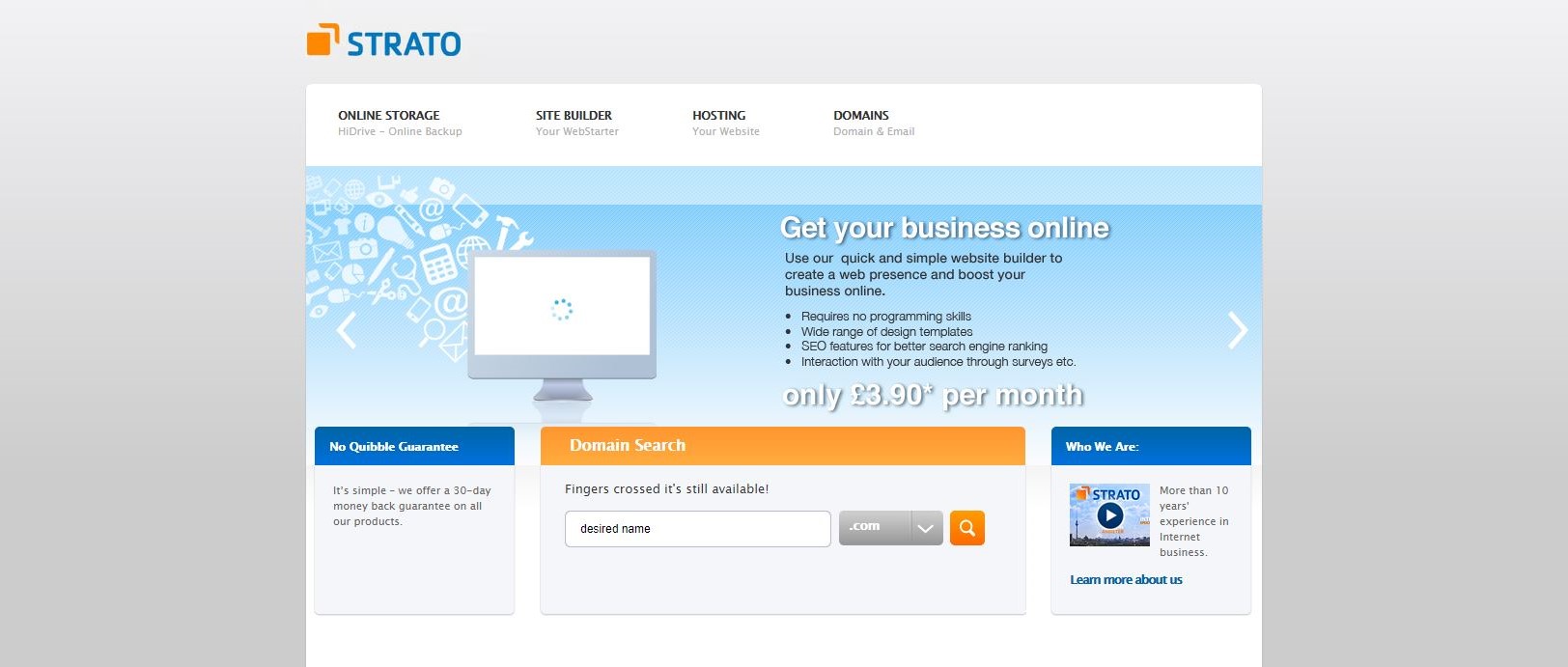TechRadar Verdict
Strato is a skilled web hosting provider from Germany backed with more than 20 years of experience in this business. Although it offers a decent value for many customers who want bare necessities, it doesn’t provide much to those with more demanding businesses.
Pros
- +
30-day money-back guarantee with all products
- +
All plans support multiple-domain hosting
- +
Eco-friendly hosting
- +
Free SSL certificate with every plan
- +
One-click installs
Cons
- -
Free customer support is remarkably limited
- -
High renewal prices
- -
Minimum contract period is one year
- -
Not available in all European countries
- -
Strato’s custom control panel is not very user-friendly
Why you can trust TechRadar
Strato (also known as Strato AG) is an experienced web hosting company operating form Berlin, Germany. It was founded there in 1997 and has since become one of the largest companies in the business. At this moment, it manages more than 2 million registered domains and 1.5 million hosted websites on its 60.000 servers all over the world. Originally, their services were available in Europe only, but in 2016 they entered the global market with a bang. They exist as a part of the United Internet AG, a veteran global internet services company from Germany that owns a total of 13 brands and a great number of subsidiaries.
In 2008, Strato lowered its energy consumption dramatically and started using renewable energy sources. Soon afterwards, it became one of the major eco-friendly hosting solutions out there. As you'd expect, Strato’s data centers are powered by 100% carbon-neutral renewable energy and are located inside Germany.
- Want to try Strato? Check out the website here
Their website, while not particularly visually appealing, does provide its users with a great deal of relevant information about the company itself and its services. In addition to the international website, users can pick the ones intended for German, Dutch, Spanish and French markets. Accordingly, their hosting plans tend to vary depending on the selected country, so we’ll be reviewing the ones with an international scope.
Although Strato has an official blog and, as far as we can tell, a fine one, it is entirely in German, so if you are not familiar with the language, it won’t mean much to you. As for social networks, they are present on Facebook, Twitter, LinkedIn, YouTube and XING, with only Facebook being partially available in English. Nevertheless, it’s good to see that all of these accounts are alive, active and willing to correspond with all of its users on a regular basis.

We have to mention Strato‘s YouTube account, which is alive & kicking, but exclusively in German, unfortunately. While checking it out, we had to ask ourselves, what can go wrong when you are powered by a happy techno has-been musical act? Do you get faster, better and even more STRATO, as Scooter’s frontman H.P. Baxxter promises?
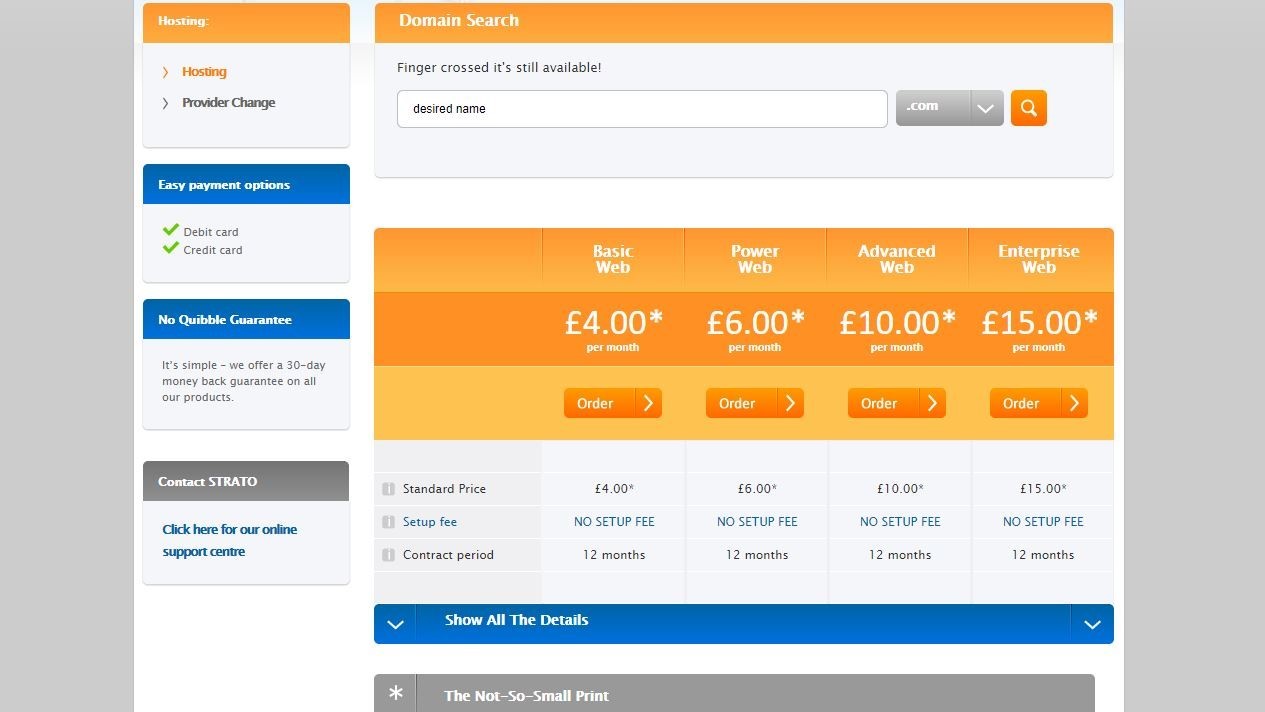
Plans and pricing
Strato provides its users with a whole range of hosting-related products: a domain name registration, shared, e-mail, VPS and dedicated server hosting, a website builder and a cloud storage.
As for the hosting plans, there are four main ones (Basic Web, Power Web, Advanced Web and Enterprise Web) and the contract period for each of them goes for one year. However, users can subsequently select a monthly billing option. The entry-level one starts at £4.00 ($5.33) per month, which seems budget-friendly at first, but you should watch out for the considerably higher renewal prices.
Sign up to the TechRadar Pro newsletter to get all the top news, opinion, features and guidance your business needs to succeed!
All annual hosting plans come with a 30-day money-back guarantee, so customers will have a full month to make a definitive decision.
Debit and credit cards are supported payment methods when dealing with Strato.
| Yes | No | Header Cell - Column 2 | Header Cell - Column 3 |
|---|---|---|---|
| Shared hosting | Colocation hosting | Row 0 - Cell 2 | Row 0 - Cell 3 |
| Small business hosting | Free hosting | Row 1 - Cell 2 | Row 1 - Cell 3 |
| Website builder | Bare metal hosting | Row 2 - Cell 2 | Row 2 - Cell 3 |
| E-commerce hosting | Video hosting | Row 3 - Cell 2 | Row 3 - Cell 3 |
| Linux hosting | Email hosting | Row 4 - Cell 2 | Row 4 - Cell 3 |
| Windows hosting | Reseller hosting | Row 5 - Cell 2 | Row 5 - Cell 3 |
| Green hosting | Managed hosting | Row 6 - Cell 2 | Row 6 - Cell 3 |
| Cloud hosting | Managed WordPress Hosting | Row 7 - Cell 2 | Row 7 - Cell 3 |
| WordPress hosting | Row 8 - Cell 1 | Row 8 - Cell 2 | Row 8 - Cell 3 |
Ease of use
Out of four available shared hosting plans, even the least expensive one will provide free domain registration or transfer, support unlimited extra domains, 1000 email accounts, 2GB of web space, SSL certificate, AntiVirus, AntiSpam and STRATO SiteGuard. This section as a whole is done in a simple, transparent and rather detailed manner, which is refreshing to see.
After choosing a plan, we were asked to choose a domain name. There we noticed an unnecessary inflexibility that might become an issue for some users. Specifically, we were able to choose between registering a new domain or transferring the one we already own, but not to leave the domain with its present manager.
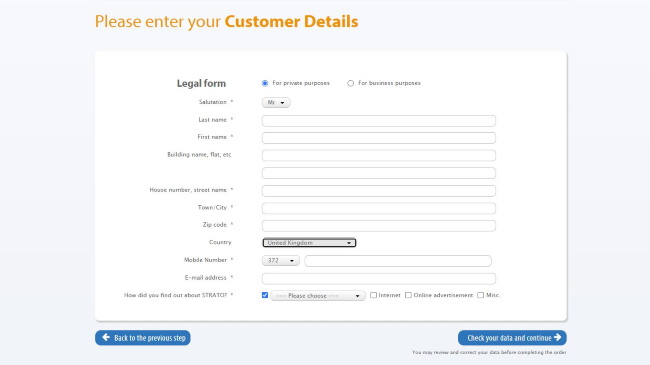
The rest of the process was a rather straightforward experience. The chart page gave us a detailed overview of the product, its individual and total cost and information about renewal prices, if we decide to stay with Strato. After this, we were asked to provide a number of personal information, yet nothing you wouldn’t normally expect. Still, while using their UK website, we did notice an absence of several European countries on the list together with their corresponding country codes. Unfortunately, since all users are required to enter their phone numbers in order to get a confirmation code from Strato, the ones who reside in one of these unlisted counties won’t be able to proceed with a purchase.
To continue, we had to select a type of credit card and the additional information about it. After making the payment, we received an instructive mail by Strato informing us that our newly created account will be activated in the next 24 hours, which is considerably longer from what we are used to. When we were allowed to eventually enter our account, we noticed that Strato provides its own custom-made control panel, which is almost never a blessing in disguise. After finally figuring out how to get around, we were able to easily install WordPress apps via AppWizard, while also observing that not many apps are available.
If you paid extra cash for the convenience of the website builder, you’ll quickly notice that the number of pages you can have on your website is limited (20 in our case) and that neither of available website builders is provided with e-commerce features. If your needs are simple, you shouldn’t be bothered by this; otherwise, you should consider other options.
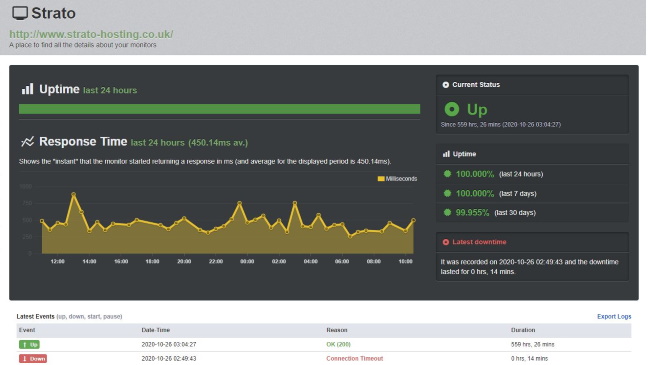
Speed and experience
Fortunately, when it comes to Strato’s main website, a speed performance recorded by GTmetrix showed promising results. It took 3.1 seconds to fully load the page, which looks more than fine in contrast to the average of 8.1 seconds. At the same time, the process required 45 requests, which is almost half the fewer requests than the average result of 89. It came as no surprise that GTmetrix finally graded the website's overall speed performance with a firm B (92%).
At first glance it seems that Strato provides no uptime guarantee. However, those who have an eye for detail and patience to read through Terms of Service will notice a promise that Strato’s servers should be available 99% of the time on an annual basis. After putting this to the test (kindly provided by UptimeRobot) we got rather good results, especially considering we didn’t have too high expectations. During more than a month of constant monitoring there were two cases of downtime, with one lasting 5 and another 14 minutes, which resulted in 99.95% of uptime. Even though monitored time is not indicative of the annual level of performance of hosted websites, it clearly is a good start.
Support
Even to the casual eye it appears that the customer support is the weakest link of Strato. They offer support via telephone (including 24/7 hotline for those who pay extra cash) and email (through contact form). To tell the truth, we were a bit disappointed with the absence of a live chat option, since it’s something we expect to see in this day and age.
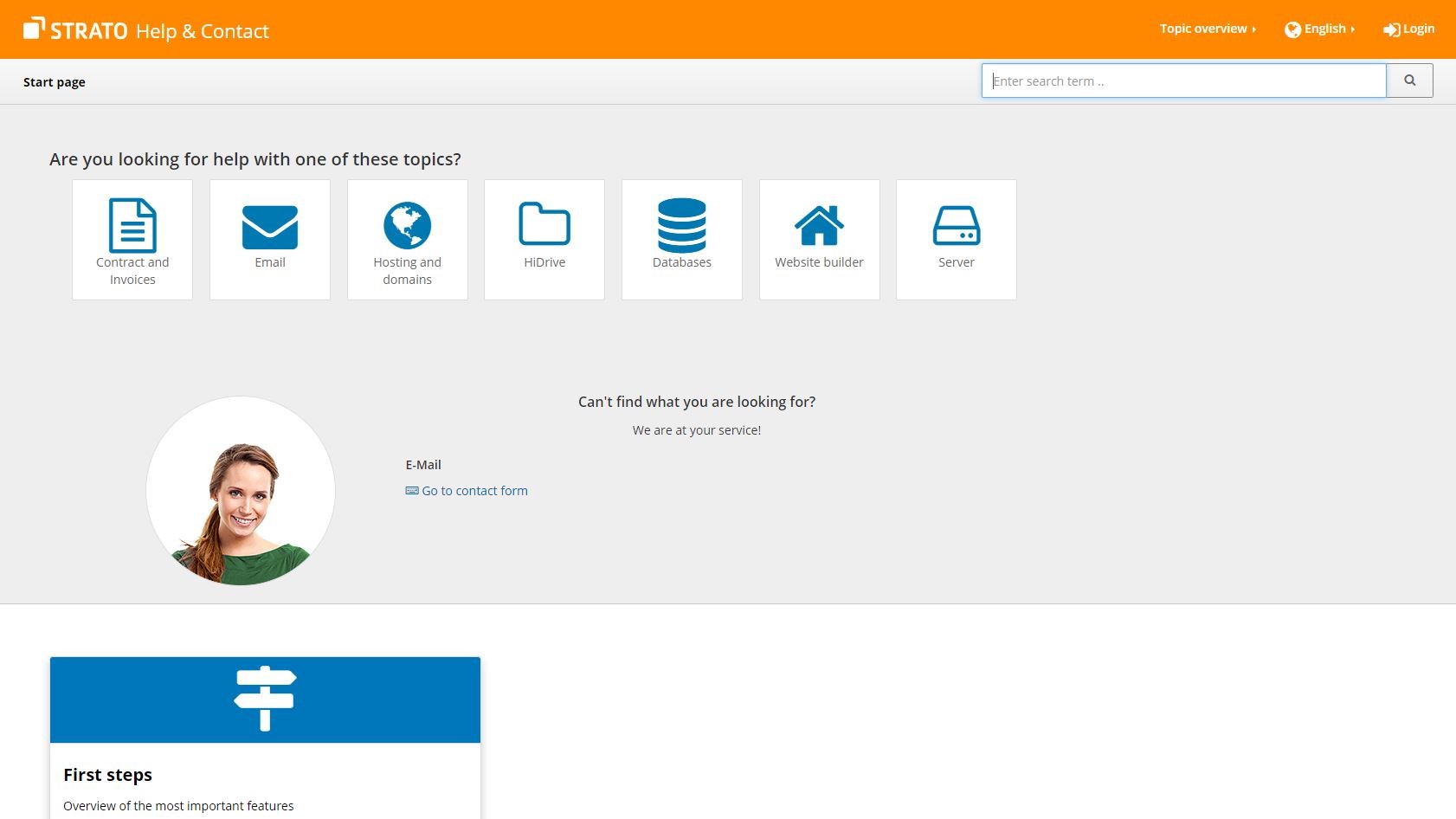
If you visit the “Help Center'' on Strato’s website, you’ll be presented with a knowledgebase and an option to seek assistance via email. This knowledgebase has a user-friendly interface and contains several familiar categories, such as “Hosting and domains”, “Database”, “Website builder” and so on. Entering any of these will lead you to a tree of subcategories and a few direct links to popular articles. As an alternative, you can use a search box option.
No matter which method you use, there is one thing you may notice and that is general lack of content. Yet, to their defense, the articles they actually provided are awfully detailed and helpful.
The competition
One of main things Strato shares with Canada-based HostPapa is their commitment to minimizing their carbon footprint and avoiding harming the environment, which is commendable. When it comes to products, both providers offer pocket-friendly prices and a free domain for new users. Yet, when it comes to newbie-friendly approach, HostPapa doesn’t stop here and offers various types of customer support, impressive self-help options and popular easy-to-use cPanel.
The most obvious difference between Strato and Hostgator is that the first one is Germany-based provider while Hostgator hails from the US. Although both are quite capable providers in their own right and have a bit of something for everyone, Hostgator takes the lead by throwing in a drag-and-drop website builder with more than a hundred mobile-responsive designs and media library, as well as a generous 45-day money-back guarantee.
Host Europe is another robust feature-packed fellow German provider which is, coincidentally, founded in the same year as Strato (in 1997). The essential difference between the two is that Host Europe is more geared towards German-speaking clientele, while in recent years Strato has shifted its focus to the international market.
Bluehost is another strong competitor to Strato, and rightly so. Both offer a decent range of hosting options, competitive prices, a free domain, gratis SSL certificate and, on a negative note, a price hike upon renewal. Ultimately, both are competent enough while being imperfect, but since Bluehost provides less expensive services overall, you might save a few bucks by choosing them.
Final verdict
Strato’s hosting solutions do not exactly fall into the beginner-friendly category, even though they do provide decent value for money to those with slightly simpler needs. It may be a capable host in its own right, but the lack of user-friendly cPanel, a modest selection of available apps and absence of live chat support makes them hard to recommend, even with Scooter’s enthusiastic music-powered approval. If you still want to give them a chance, do it by all means, but check out more recommendable options like Hostinger, DreamHost or Bluehost before making a decision.
- We've also highlighted the best web hosting

Mike is a lead security reviewer at Future, where he stress-tests VPNs, antivirus and more to find out which services are sure to keep you safe, and which are best avoided. Mike began his career as a lead software developer in the engineering world, where his creations were used by big-name companies from Rolls Royce to British Nuclear Fuels and British Aerospace. The early PC viruses caught Mike's attention, and he developed an interest in analyzing malware, and learning the low-level technical details of how Windows and network security work under the hood.
